20 Car Rental Switzerland TIPS to Know

Planning on renting a car in Switzerland and need some tips? Switzerland is a small and pretty easy country to travel around. Because of this, many visitors may choose to travel by public transport, but renting a car and having your own set of wheels is best for ultimate freedom.
Where should you rent your car, what kind of prices should you expect, and what all do you need to know about renting a car in Switzerland? We’ll break it down!
If you're looking to book a car rental Switzerland quickly, see rates on Discover Cars.
Car Rental Switzerland Tips
Plan Your Trip to Switzerland
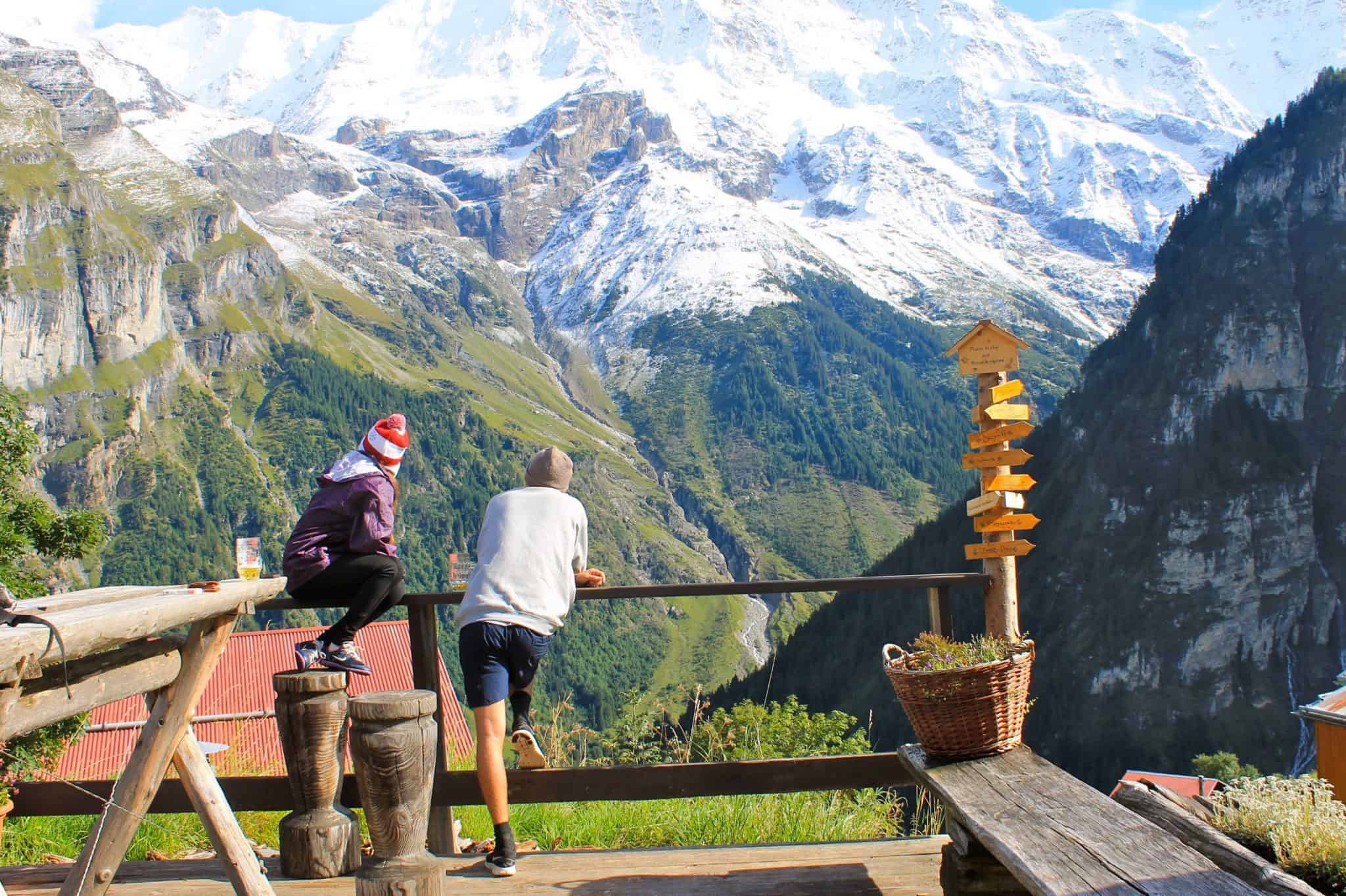
Being a mountainous country, Switzerland doesn’t have a plethora of airports. That means the primary way to travel around the country is via train. But if you don’t want to be beholden to the train network, car hire is a top option. Trains in Switzerland are extremely expensive unless you have some pre-bought pass, so always look at car rental Switzerland prices to determine what’s best for you, depending on how much you move around.
Many visitors arrive into Switzerland at Zurich International Airport. From there, it’s relatively simple to rent a car, thanks to many companies having a presence at the airport – including well-known international companies such as Avis and Hertz.
That being said, on our last few trips to Switzerland, we flew to Munich because it was much cheaper and then drove into Switzerland. Crossing into Switzerland via land may save you a lot of money on car rentals, but we’ll get into that further.
If your final destination is Switzerland, and you want to potentially save some money on flights and a car rental (because Switzerland is mega expensive) some great airports to look at are Milan, Munich, Innsbruck, and Lyon. The whole of Europe is connected well, so you don’t have to fly to Switzerland to rent your car and drive around there.
Book Your Rental Vehicle
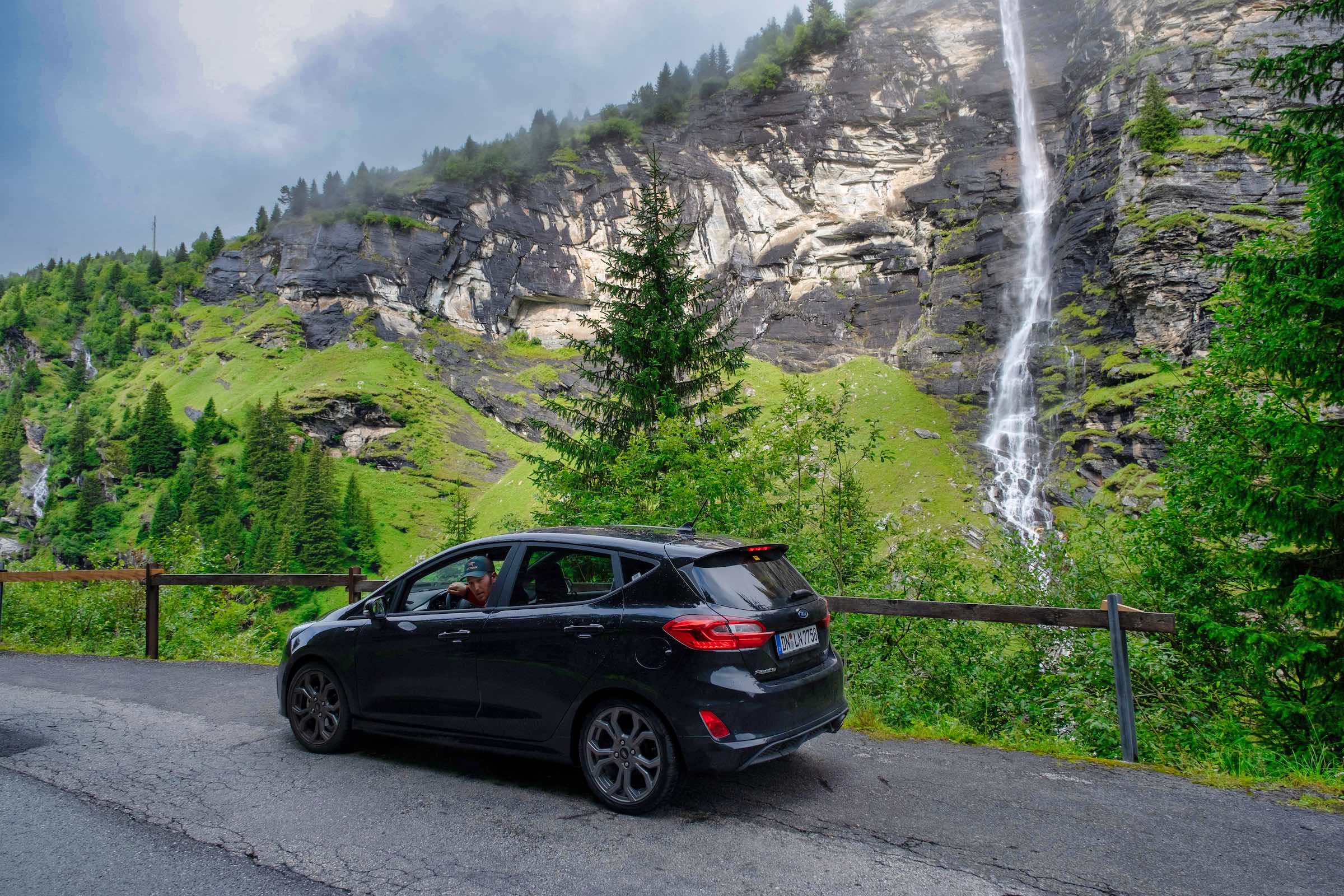
Switzerland won’t have any shortage of vehicles that you can hire. That said, if you want the size, type, or even brand of car that you desire, it’s advisable to book in advance – especially if your whole trip relies on having your own wheels. This is easily done online, of course.
Not only does booking in advance allow the luxury of choice, but it may also mean that you get access to early bird booking deals (21 days or more is usual), as well as discounts for booking in advance/online as opposed to walk-up bookings. It’s better to plan ahead.
Tip: It’s cheaper to rent your car in Austria, Germany, Italy or France and then embark on your trip to Switzerland from there. We personally rented our car in Munich at Hertz for the price of €20 a day and it was far cheaper than anything we would have paid in Switzerland. Although you will need to purchase a "vignette" for driving a foreign car in Switzerland. You can purchase these vignettes for 40 Swiss Francs that are valid for a year of driving on Swiss motorways. Vignettes can be purchased at land border crossings as well as many fuel stations and online.
My favorite sites to look at are:
- Discover Cars: What we use to search rental car prices around the globe.
- RentalCars.com: Provides comparisons for car rentals in Europe.
Choose Your Rental Vehicle

Choosing your rental vehicle is essential, depending on the roads you plan to drive on. Something larger (e.g., a sturdy 4×4) is fine if you’re hopping from city to city via the country’s very efficient superhighways, but not so much if you plan on visiting villages hidden away in valleys reachable only by narrow, winding mountain roads.
Bear in mind that cars are available in two types – manual and automatic. Manuals are always cheaper and in more abundance in Europe. If you’ve never driven a manual before, we’d suggest that it’s not a good time to start learning abroad – especially not in the mountains of Switzerland. Go automatic. And if you’re feeling eco-friendly, you can opt for an electric option.
If you’re traveling to Switzerland during the winter months, you’ll want to ensure that you are familiar with driving in snow and slippery conditions. You’ll also want to ensure your car has winter tires, especially for driving the mountain passes in the Alps.
Upfront Costs with Driving in Switzerland
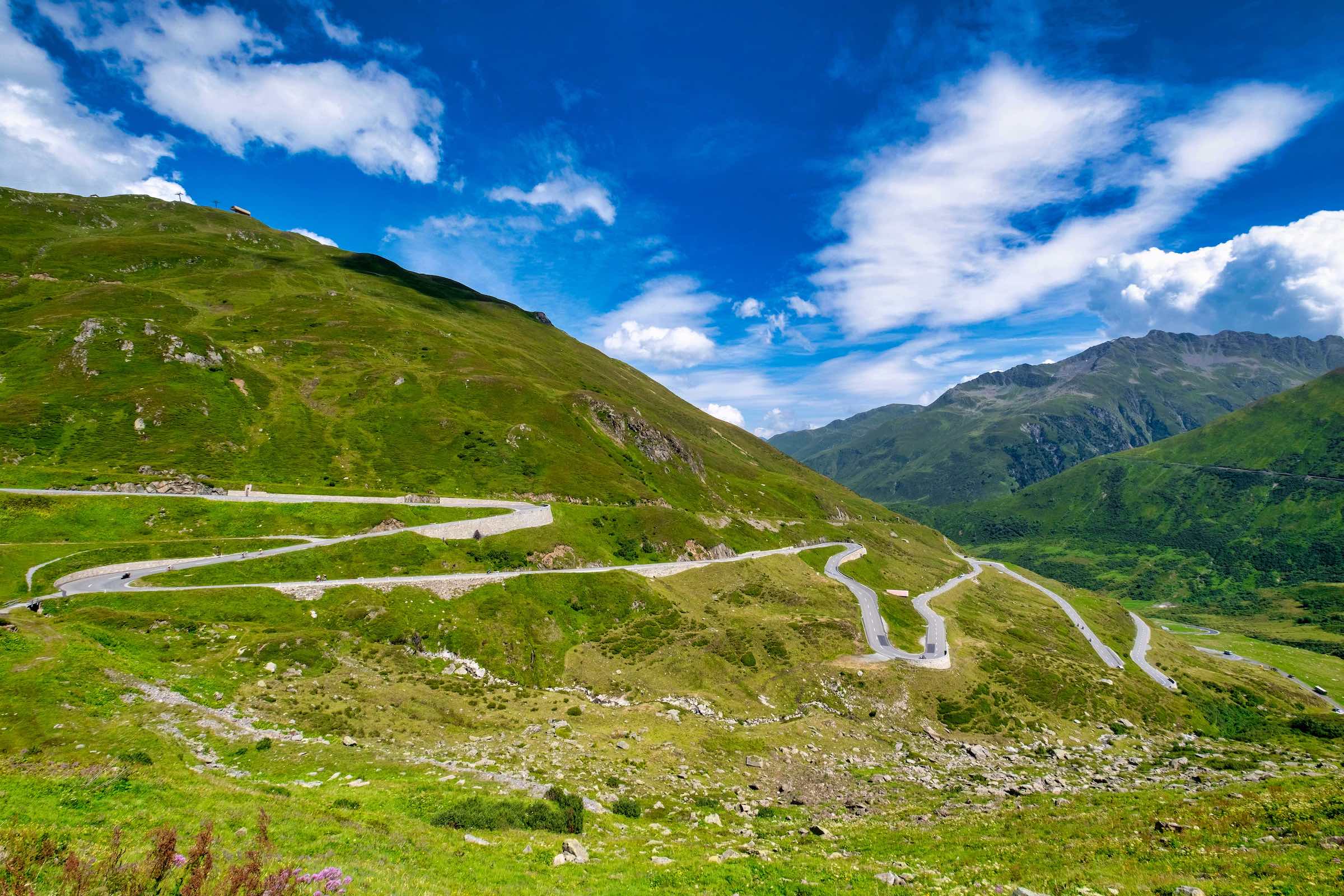
Before you even start driving around and filling your new wheels up with delicious diesel or gas (whatever the case may be), the average car rental in Switzerland will cost you an average of $359 per week. That’s $51 a day, though it truly all depends on the season. Summer and winter are both high seasons in Switzerland. But it’s best to play around on different car rental sites before you book to get the best rate. I like to check Discover Cars and Rentalcars.com.
This price will also include the 6.5% government tax on rental cars in Switzerland, bundled in with a 12% tax that’s standard for rentals from the country’s airports. This means you may want to pick up your car further from the airport. So when you see the prices, opt to pick up from a Downtown location to miss out on those fees.
That’s the average, of course. Depending on the time of year, it could be much more expensive (the Holiday Season, Ski Season, Easter, and the Summer Vacation, to be exact). Of course, booking online and in advance will almost certainly yield cheaper results, too.
Pay attention when booking well in advance. I like to book cars with free cancellation if travel plans change.

Gas or diesel?

If renting your car in Switzerland you’ll find the cost of gas and diesel varies across the country. The general rule of thumb is that it’s more expensive along superhighways (called Autobahns) than on secondary roads or in towns. And it’s more expensive than in the U.S. if that’s where you’re coming from.
Unleaded petrol is the norm in Switzerland; you’ll find it in the green pumps at gas stations. Diesel is everywhere too. Obviously, it can change, but generally, it’s 1.60 to 2 CHF (Swiss Francs) per liter (not gallon) for unleaded, and 1.20 for diesel.
Rental Car Insurance in Switzerland
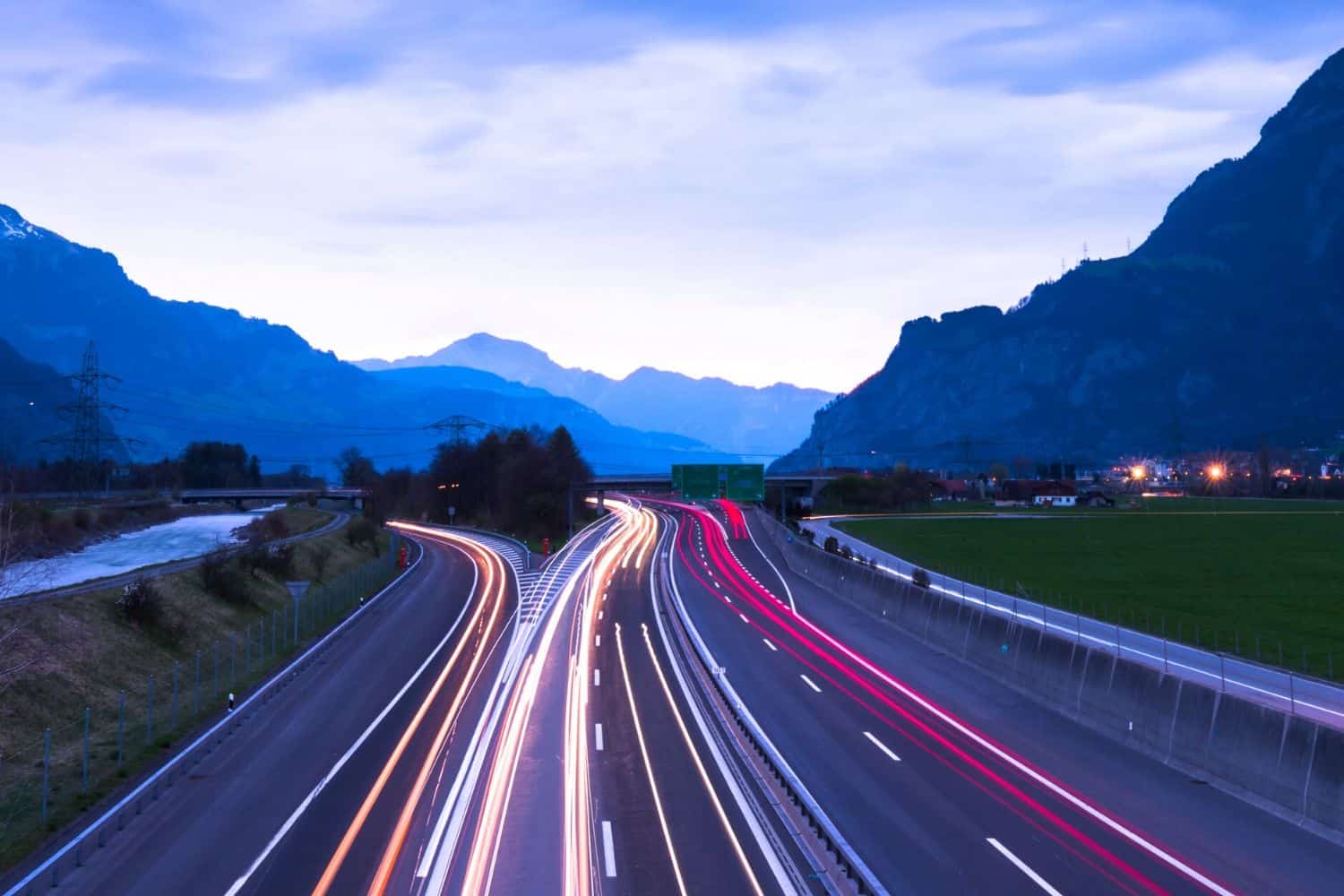
Car insurance is often built into the price of hiring a car in Switzerland. It’s illegal to drive without car insurance, so most often, it will be part of the final cost of your rental car.
If you’re traveling around Switzerland as a couple or group and someone else wants to drive, you’ll have to specify when you pick up the car and have them registered as named drivers if they’re covered by insurance. Or you can double-check if your credit card has car rental insurance on it. This brings me to my next point.
Get the Right Credit Card

If you have a US credit card or equivalent in another country, you may already have CDW (collision damage waiver) insurance for rental car coverage and don’t know it! It’s worth checking your documentation and calling your credit card company to find out. It’s even worth considering signing up for a new credit card that does offer this, so you don’t have to pay for ridiculous car rental insurance. See our favorite travel credit cards here.
Bringing me to my next point – credit cards with primary rental insurance. The Chase Sapphire Reserve is my favorite travel credit card for many reasons, but the primary rental insurance is one of its best perks (including Priority Pass membership). When you put your car hire on your Chase Sapphire Reserve card, you get primary rental car coverage around the world up to $75,000.
That works out great for us since we are nomadic. Car rental companies in Switzerland and worldwide love to scare customers and upsell all their extra insurance packages. You need to make sure if you need it or not before falling victim to their trap. Call your credit card company and always find out before you travel to Switzerland.
If you don’t have a credit card that covers rental car insurance, it may be worth adding it on to your package. That way, you won’t be stuck paying for a car hire out of pocket if there is an accident.
Hold charges on Your Car Rental Switzerland

Hold charges, an amount “billed” to the credit card you use to book, are a thing and can range anywhere from a minimum of around 200 Swiss Francs to the thousands. It’s a widespread practice.
Don’t worry; it’s not charged to your credit card; it’s on hold in case something goes wrong with the car or you do something stupid, like crash the vehicle and run away or attempt to steal it. Believe it or not, it happens!
Navigation in Switzerland

Navigating your way around the roads of Switzerland shouldn’t be too tricky. This developed country has a sophisticated road network, from well-maintained mountain roads to super slick autobahns.

Your car may come with an in-built GPS (which we recommend, just in case your own methods fail), but that may mean a more expensive rental. Google Maps, an app available on your smartphone, will usually work just fine. Make sure you pre-load your journey while you have wi-fi if you don’t have a Swiss sim card. Google Maps lets you download offline maps, so you always have turn-by-turn navigation.
Get a Sim Card

It’s always a good idea to be able to use your phone when you’re driving a car around a foreign country. You may need to call for assistance.
A local sim is something we recommend. Data means not having to rely on pre-loaded routes, too. Pick one up from the airport from as low as 20 CHF, and you’ll get 2 to 3 G.B. of data and multiple minutes calls and SMS; the national provider is Swisscom. We pick up a sim card in almost every country we visit. You can also get an eSim so you’re prepared before you land with Airalo.
If you’re not at the airport, you can always pick up a sim card at any Swisscom, Salt Mobile, and Sunrise Mobile. They are often found inside malls in Switzerland.
Car Pick Up/Drop Off

Like most countries, the car pick-up process in Switzerland is straightforward. You’ll be shown the paperwork (usually completed in an office and with not much for you to fill in), you’ll have to sign some documents, then you’ll be shown around the car.
They’ll point out any major defects to you – at which point, you should point out them too- and show you the fuel. Dropping off the car is simple enough – you’ll have to ensure you get there on time. Incurring a late fee adds unnecessary expense to your journey. And don’t forget to ensure the tank is full, or at least the same as when you picked it up.

Inspect Your Car Rental

Being in Switzerland, you shouldn’t be hassled or scammed too much (if at all) about alleged “damage” you’ve inflicted upon a rental vehicle. Sure, it’s not like renting a motorbike in Thailand, but inspecting your rental car thoroughly is advisable.
Always say yes when asked if you want to look at the vehicle. Before you drive off, take photos or film as proof of any dents or scratches. If the damages aren’t noted on your rental papers, you should ensure they get added before leaving the rental car agency.
Check Your Charges

It could be a mistake, but these things happen. The hold charge? That might have become an actual charge. Or the rental company may have added extra fees when they weren’t supposed to. Usually, this sort of thing is a mistake, but it still needs to be worked out.
It’s best to check before you leave the country; dealing with home and calling abroad will be harder. It’s easier to dispute with the company there and then, rather than sitting for hours on an expensive helpline.
Drinking and Driving in Switzerland

The current alcohol-blood limit (BAC) is 0.05%, which is 50 milligrams per 100 milliliters. That means you shouldn’t drink anything at all when you’re driving.
You’ll either be fined or arrested if you’re tested, and your BAC comes out between 0.05 and 0.079%. If it’s higher, the fine will be higher, you can be arrested, and your driving license could be confiscated for three months (at least). Even if you’re the passenger, you can still be held responsible – if you have a driving license – and fined.
With some of the strictest DUI limits in the world, it’s just not worth it – and it’s dangerous. Be careful if you’ve been drinking the night before and drive in the morning, as the alcohol could still be in your blood.
More Switzerland Car Rental Tips
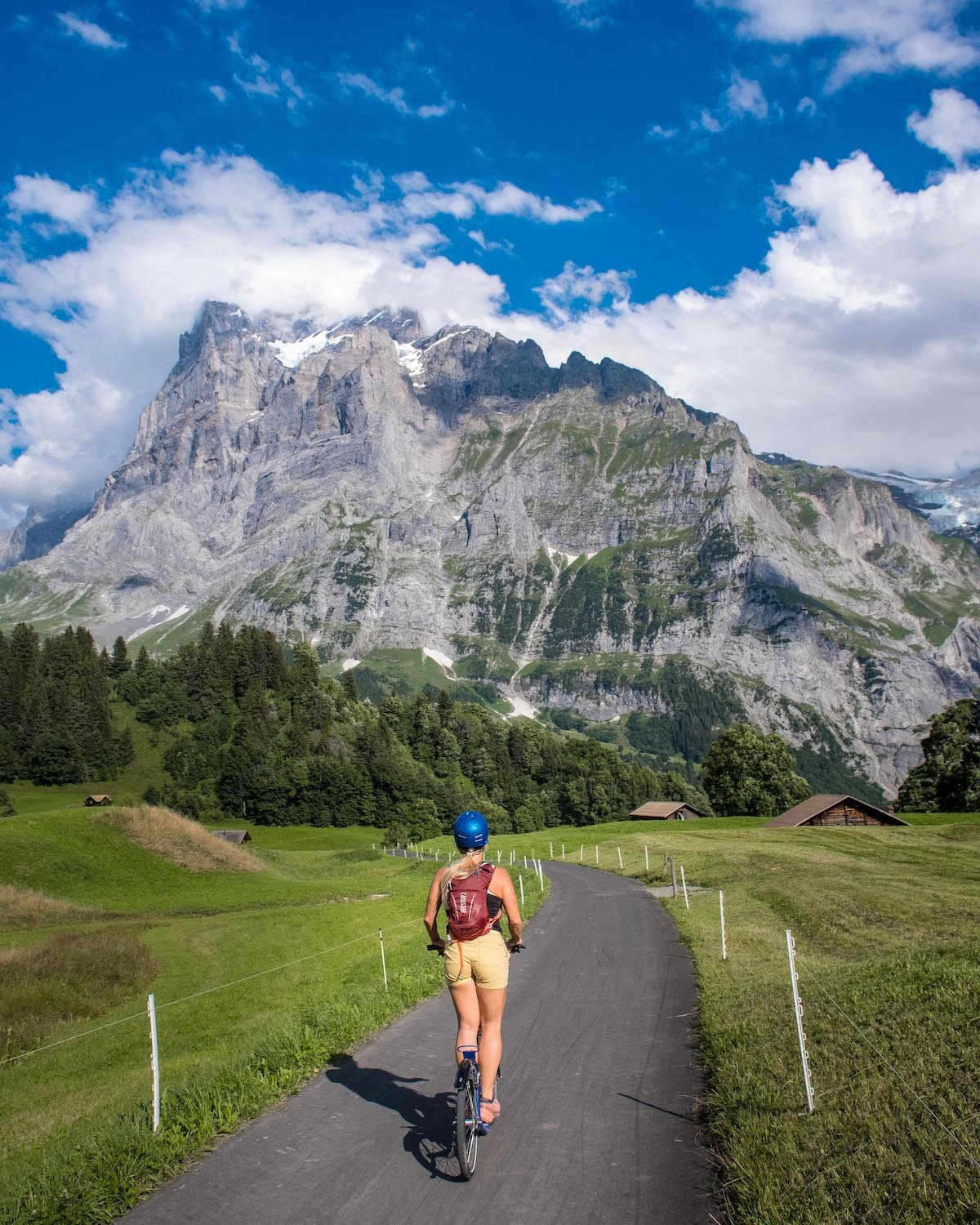
- With Switzerland being a mountainous country, rental cars will (usually) be equipped with special tires in the winter season. These are a must.
- Most Alpine passes can be driven all year round, but tunnels may be opened instead, depending on danger levels. You must have your headlights on at all times – day and night; not doing so could result in a fine. Keep them on low beams in tunnels; you don’t want to blind people.
- They drive on the right in Switzerland, which is great if you’re from the U.S. or anywhere that applies. You have to wear a seatbelt.
- If you’re on a mountain road, the ascending vehicle has priority. Postal buses, however, always have the right of way, regardless of direction.
- If you are visiting Zermatt, Saas-Fee, or any other car-free village in Switzerland you will be required to park your car for the duration of your stay. You won’t have any need to drive it. So if you are staying in Zermatt for a week, it may be worth it to not have a Switzerland rental car or to get rid of it as you’ll be paying for the rental and to park the car overnight.
Cost of a Switzerland Rental Car
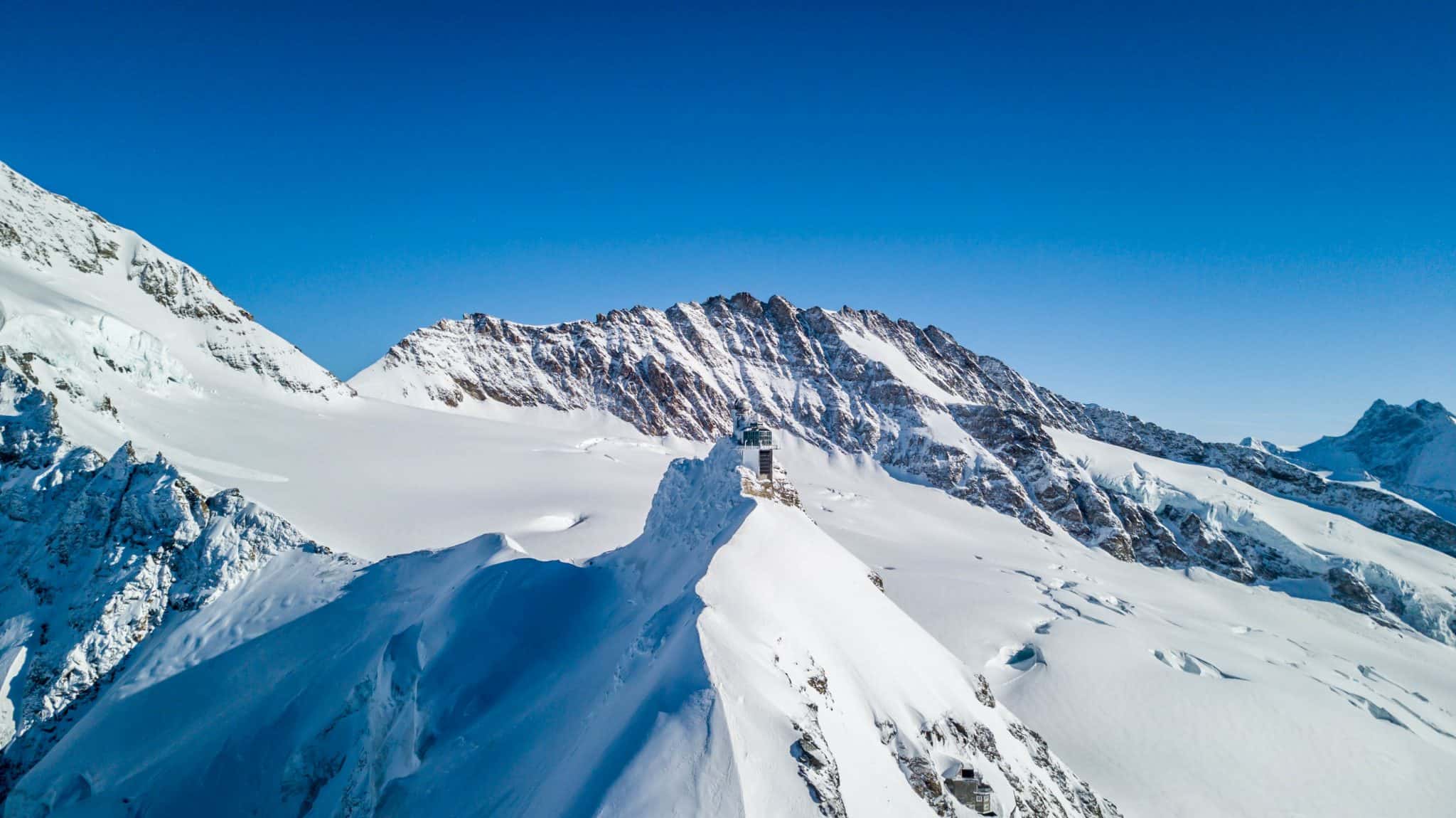
Two main factors will dictate how much your rental car will cost you in Switzerland – when you book and where you book.
Booking online is much better; the more prominent companies (Avis and Hertz, as we’ve mentioned) will be more reliable, efficient, and possibly have deals. Our favorite sites to look at are Discover Cars and Rentalcars.com to compare rates.
If you want to drop off at a different location than you picked up, you’ll have to pay a “one-way” fee and parking fees. We found that most places in Switzerland charge you to park. This includes many grocery stores. Something to keep in mind when budgeting.
The time of year will also affect the booking. Though booking 21 days (or more) in advance will be cheaper, it might not matter if you’re booking for Summer or Spring Vacation; this is when all of Europe goes on vacation, and prices will be at a premium. See the best time to visit Switzerland here.
If you are really trying to save on costs, check car rental rates in nearby countries too. Switzerland car rentals are some of the highest we saw in the area. This is why we flew to Munich and rented our car there for our Alps trip.

Roads in Switzerland
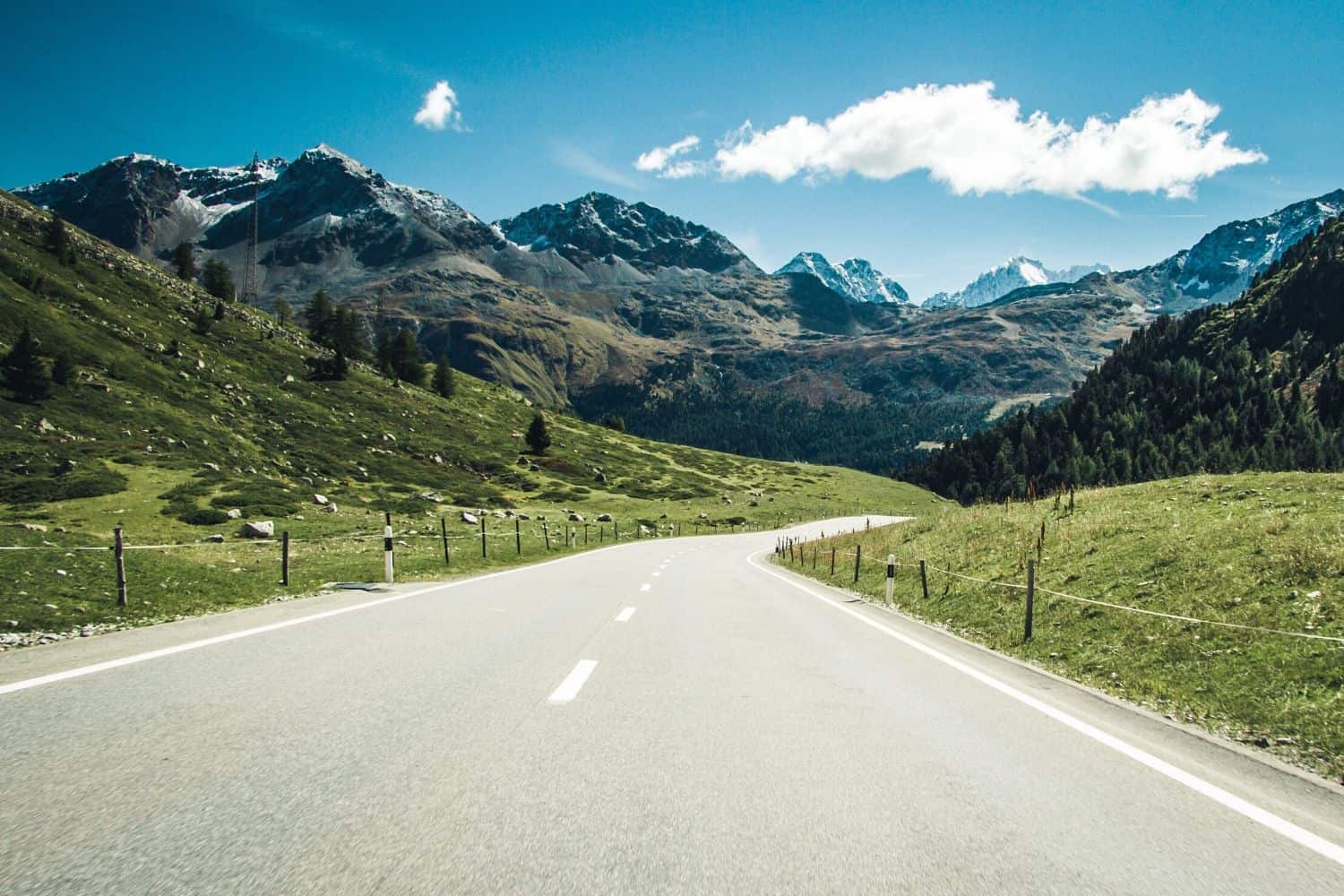
It’s good to know that you’ll be driving on well-built and well-maintained roads with your car rental in Switzerland. You shouldn’t have too much trouble with Switzerland’s roads. What’s more is that the roads are usually open all year round, depending on the weather, of course.
One thing to consider is the Great Saint Bernard, San Bernardino, and St Gotthard Passes. If you want to drive those, you may have to use a tunnel instead, as they’re often closed, but we always found that Google Maps routed us in the right direction. However, this is because we had data on our sim card, and we could get turn-by-turn directions and quick updates on road conditions. If you are driving in Switzerland, it’s worth it to have access to the internet on your phone.
Sometimes, you’ll have to take your car on a train… through a mountain (such as at Furka Tunnel). We also took a car train tunnel when we traveled from Kandersteg to Zermatt – it was awesome! This is pretty cool and allows you to chill out for a little while, though you must stay inside your car.
Toll Roads in Switzerland
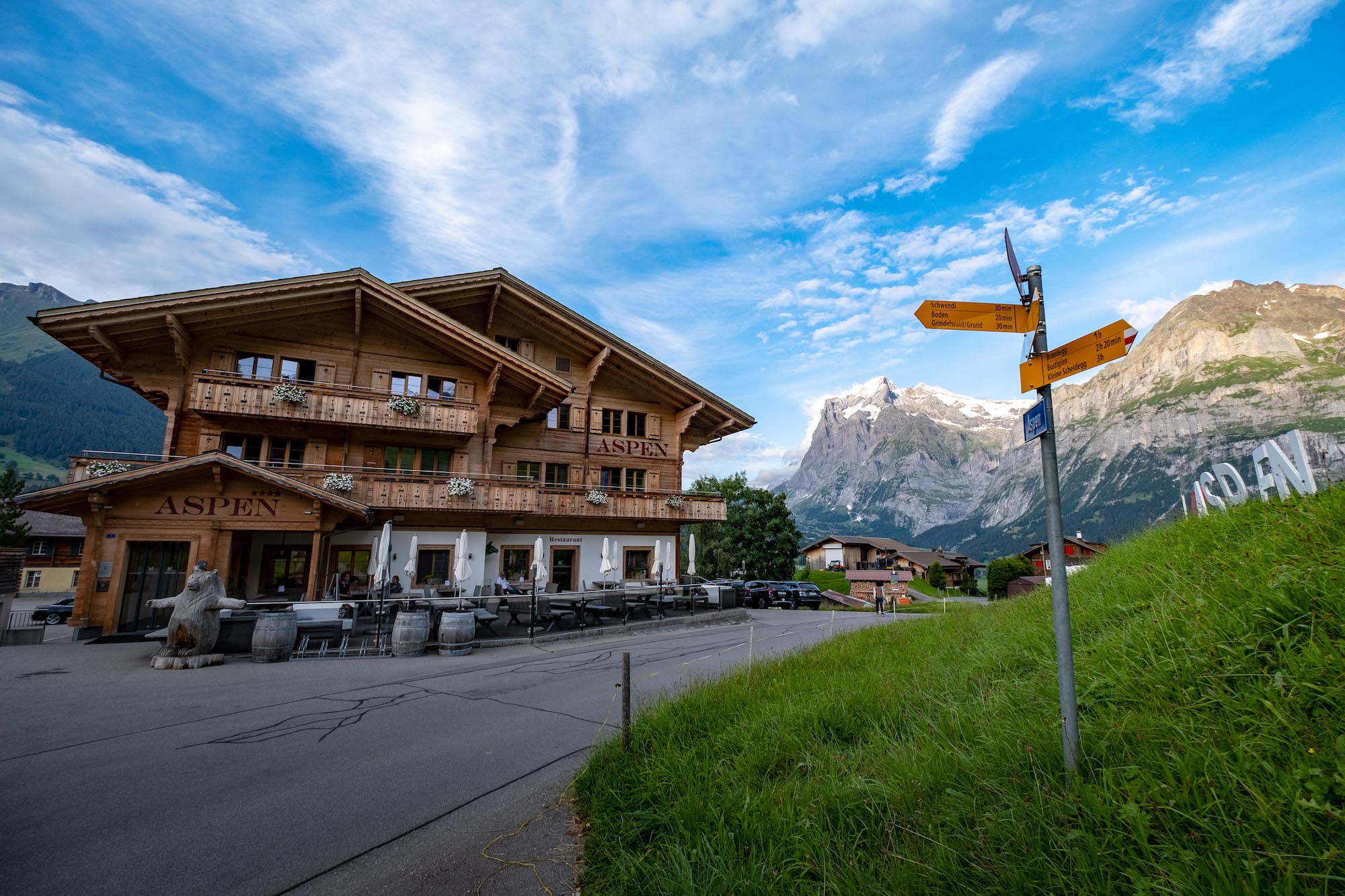
Your automobile will come with a sticker displayed on the windshield, meaning you won’t have to worry about paying road tolls in cash. However, you might be billed at the end of your car rental contract, but the agent should let you know about this when you pick up your car.
As mentioned previously, if you have rented the car from another nearby country, you’ll have to purchase a vignette at the border or at a gas station before you get on the national highways.
Fill up Your Car Rental in Switzerland

Gas stations in Switzerland can be found on big highways and smaller roads. These are typically open from 8 am to 10 pm, but on autobahns, they’re usually 24 hours.
Make sure to bring enough cash with you as your foreign credit card won’t always work, though we honestly never had a problem using our credit card anywhere in Switzerland. Also, make sure to fill up enough, so you don’t run out in remote areas.
Should You Travel With a Car Rental in Switzerland?

If you’re a confident driver and preferably have had some experience driving abroad (and on mountainous roads), then yes – you should definitely rent a car in Switzerland. Also, if you are frequently moving throughout the country and are a group of two or more, you’ll likely save more money traveling by car than by train. It’s a beautiful country, and you’ll get to see some incredible hidden areas that you may miss out on otherwise.
If you’re only planning to be in city centers and staying put in one area for a long time renting a car may not be worth the money – parking fees can rack up, and the public transport is great in Switzerland. Also, the Swiss train system is top notch, and you can pretty much get anywhere via train, for a cost!
Check Car Rental Switzerland Rates Here
TRAVEL SWITZERLAND
We have plenty more Swiss travel tips!
- 27 Best Places To Visit In Switzerland
- 15 Beautiful Switzerland Waterfalls You Have To See
- Hiking in Switzerland: 20 Best Hikes in Switzerland
- 20 Switzerland Travel Tips To Know Before You Go
- What To Wear In Switzerland? A Switzerland Packing List
- 16 Things To Do In Grindelwald in the Winter
- When is The Best Time to Visit Switzerland?
- Facts About Switzerland To Know
Switzerland Travel Planning Resources
- Packing Guide — Check out our Europe Packing Guide to help pack your bags and ensure you don’t leave anything at home.
- Rent a Car — We suggest most visitors consider renting a car for the best trip possible. Try Discover Car Hire to compare quotes from different rental agencies. Check Price Here!
- Protect Your Trip: We don’t travel without travel insurance, nor should you. You never know what can happen while traveling, so it’s best to be prepared. HeyMondo provides excellent short-term and long-term travel insurance plans.
- Tours in Switzerland— Check out our list of the best tours you can enjoy in Switzerland!
- Travel Adapter – Make sure you find a good adapter to keep your personal electronics charged. Otherwise, you may be paying for a cheap one once you land. Purchase one here.


When you say car rental insurance is built into the charges in switzerland, what do you mean ? Can you be more precise and provide evidence ? Is personal liability included ? To what level ? CDW ? LDW ?
I said “often” you will have to do your research with your car rental company of choice and confirm with them what is included and what level of coverage.
Wonderful article Natasha! Valuable points and highlighted to precision. I also appreciate how you highlighted the possible victim traps. Thank you!
hi. what type of plug in adapter will I need for a rental car to charge phone while driving?
thank you,
I would bring a USB cord for your phone, most cars have USB charges in them.
Hello! Great article! I was wondering about having a driver’s license. Do I need an international driver’s license or will my US driver’s license work?
Your US license should work!